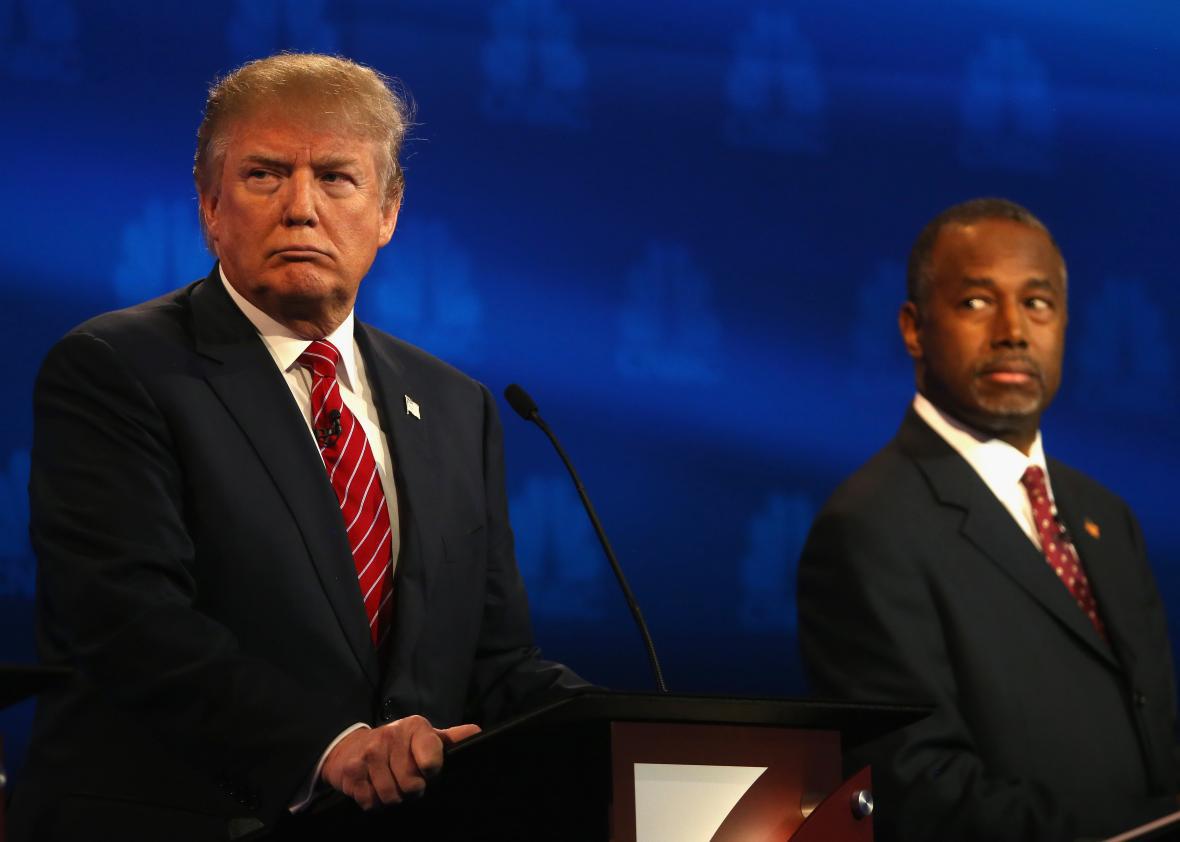Early on during Wednesday night’s Republican presidential debate, CNBC moderator John Harwood made a valiant effort to interrogate Donald Trump on the subject of taxes. He failed, but the result was still illuminating. The real-estate mogul had promised to cut the government’s tax haul by $10 trillion without adding to the deficit, Harwood noted. How was that feasible?
“I talked to economic advisers who have served presidents of both parties,” Harwood said. “They said that you have as much chance of cutting taxes that much without increasing a deficit as you would of flying away from that podium by flapping your arms.”
Trump interjected. “Then you have to get rid of Larry Kudlow, who sits on your panel, who’s a great guy, who came out the other day and said ‘I love Trump’s tax plan.’ ” And that was all it took. Trump had dispatched Harwood’s question by referring to the authority of CNBC’s in-house champion of unreconstructed supply-side conservatism. The show quickly moved on.
The exchange was a minor triumph for Trump, whose campaign has been a testament to the complete irrelevance of rational policy discussion in the Republican primary, especially when it comes to economics, the subject of Wednesday’s debate. Over the campaign, the GOP candidates have rolled out variously gaudy and implausible tax-cut plans, all while promising to keep the country from falling deeper into debt. Even Jeb Bush, the early establishment favorite, has engaged in this sort of magical thinking, offering up a proposal that could cut up to $3.6 trillion from government revenues over a decade, according to the conservative Tax Foundation’s high-end estimate. Marco Rubio, who’s quickly becoming the new favorite of party mainliners, actually goes further—he’d cut as much as $6 trillion. But Trump’s approach is notable for its sheer thoughtlessness. His blueprint is suspiciously similar to Bush’s, but with even lower tax rates, resulting in the budget-busting, $10 trillion monster that he says he will somehow balance by cutting government waste.
High-profile conservatives have lapped it up. Anti-tax guru Grover Norquist gave Trump’s plan his seal of approval early on, while Kudlow seems to be enthralled by the Donald’s plan to slash corporate tax rates. “I don’t know all the details about his entire tax program, it’s certainly moving in the right direction lowering rates but specifically on the 15 percent corporate tax rate I have argued for it for several years,” Kudlow told Breitbart News. “Again, I can’t speak for the whole plan—I can speak for the 15 percent corporate tax rate. He’s spot on. And I’m honored that he mentioned me. Honored.”
To be clear, Kudlow is saying he’s honored to have been named as a supporter of a plan he hasn’t read in its entirety.
That, essentially, is the state of Republican policy discourse these days—a debate that’s mostly about signaling conservative bona fides rather than detailing a realistic way one might actually run a country. Ben Carson says he’s in favor of a tithing-inspired flat tax of about 15 percent, which he will somehow balance out by cutting “fat” from the government. Ted Cruz is promising a flat tax of 10 percent. Both would likely cost trillions. But compared with Bush’s or Rubio’s plans, they only look like a slight ratcheting up of the crazy.
And ultimately, GOP candidates have little reason to offer something more serious. Impolite questions from journalists don’t matter much, since the GOP base doesn’t trust the mainstream media. They matter even less when party opinion-makers like Norquist and Kudlow are happy to bless the most radical ideas that come down the pipeline. Meanwhile, few of the candidates either want to or have standing to criticize their opponents. One exception is Ohio Gov. John Kasich, who has decided to pitch himself as the realistic Republican, and who spent Wednesday’s debate lambasting his fellow candidates for their “fantasy tax schemes.” But so far, the man has made zero headway in the polls. Right now, voters seem to prefer fiction.
Of course, you could argue that both parties suffer from this kind of myopia. Voters are busy and don’t exactly spend a lot of time diving into the policy weeds before they pick a candidate. Progressives have thrilled to Bernie Sanders’ promises like free public college tuition, a national $15 minimum wage, and drastically higher taxes on the wealthy—all of which are fairly sweeping and (in some people’s views) not necessarily good ideas. But you can at least imagine a path to achieving such things, for better or worse. There is no conceivable way, on the other hand, to cut $10 trillion in taxes over 10 years and without capsizing the budget or devastating the entitlement programs upon which millions of Americans rely. But that’s exactly what Trump is selling—and, at least for now, what Republican voters are happy to buy.
